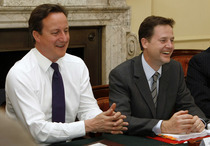 This is the next of our posts with Reform looking ahead to the Spending Review.
Earlier posts were on health, education, the first hundred days, welfare, the Civil Service, international experiences (New Zealand, Canada, Ireland), Hon Ruth Richardson’s recent speech and how to sell the case for cuts.
This is the next of our posts with Reform looking ahead to the Spending Review.
Earlier posts were on health, education, the first hundred days, welfare, the Civil Service, international experiences (New Zealand, Canada, Ireland), Hon Ruth Richardson’s recent speech and how to sell the case for cuts.
On Thursday, I took part in a spending review debate in West Bromwich, part of a series the BBC held across England (my colleague Patrick Nolan wrote about his experiences in London and the East
here) to discover the public’s views on what
should be cut or saved in their local area.
I felt a bit of an intruder talking to the local council leaders and regional business people beforehand, explaining that I was from a think tank in London – these people knew what could be
cut from the West Midlands’ public services with least damage and where resources should be focused.
There were some sensible contributions both on reducing the costs of public services and on generating wealth in the region. Councillor Philip Atkins of Staffordshire County Council talked
about the efficiencies that could be made by councils clubbing together to provide services. Emma Bridgewater described how she and her husband had combined local pottery skills with
commercial acumen to create a successful business in Stoke. A recent graduate from Birmingham University told us how he had responded to a stagnant labour market by setting up his own online
company with a friend.
But others were less thoughtful and the discussion quickly turned into a series of individual arguments for the protection of particular programmes or jobs. The NUS President said the
Government must protect higher education funds if we’re to have future growth. An Arts Council director made the case for public spending on the arts for tourism and quality of life
reasons. A publicly funded youth services organisation said it was vital if young people in the West Midlands were to find jobs.
Even more bizarrely, many seemed to have come along to make the case for more spending not less. Clearly, many council leaders and representatives of public sector unions and regional quangos
are not ready to debate about how to deal with cuts, where efficiencies in local public services could be made and what should be prioritised. It wasn’t a discussion between users of
public services – members of the public – at all, but between spenders of public money, all with an interest in protecting their pots of funding.
I sat next to the Rt Rev David Urquhart, Bishop of Birmingham and a well-respected figure in the region, who gave his reflections on the afternoon’s discussions. The years ahead would
be painful, he said, the only way to get through it is to act together and get on with it. He also pointed out that the fiscal crisis offered an opportunity for people in the West Midlands to
take a long-term view on what kind of region they wanted to be in the future.
The Reverend’s message made sense to me. The cuts are coming and around the country people can either put their efforts into defending their patch, or into having serious discussions
about what the state will be able to provide going forward, and how the reduction in public spending can best be managed. The latter is what the Government has attempted to achieve with its
public spending challenge. My experience in West Bromwich suggests they should have done more over the summer to inform public opinion about the challenges ahead.
Lucy Parsons is the Research and Corporate Partnership at Reform






Comments